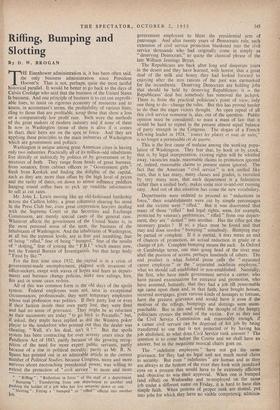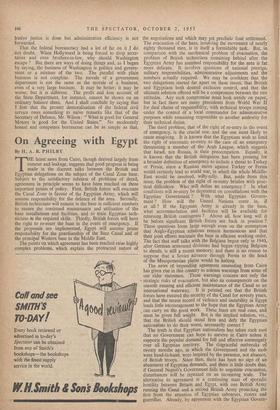Riffing, Bumping and Slotting
By D. W. BROGAN THE Eisenhower administration is, it has been often said, the only business administration since President Hoover's! That is not, perhaps, quite the most tactful historical parallel. It would be better to go back to the days of Calvin Coolidge who said that the business of the United States is business, And one principle of business is to cut out unprofit- able lines, to insist on rigorous economy of resources and to assess, in accountant's terms, the profitability of various lines, cling to those that are profitable, scrap those that show a loss or a comparatively low profif rate. Such were the methods, of the great makers of modern industry and if none of them is now in Washington (none of them is alive if it comes to that), their heirs are on the spot in force. And-they are applying these principles to the main industries of Washington which are government and politics.
Washington is unique among great American cities in having only two industries. Practically all of its million-odd inhabitants live directly or indirectly by ,politics or by government or by mixtures of both. They range from heads of great bureaus, from senators, from cabinet officers to " Government girls " fresh from Keokuk and finding the delights of the capital, such as they are, more than offset by the high level of prices and the rarity of dates, on down to minor influence peddlers hanging round coffee bars to pick up vendible information to sell at cut rates.
Mr. John L. Lewis moving like an old-fashioned battleship across the Carlton lobby, a great columnist clearing his mind in the Press Club bar, even great corporation lawyers dealing with the Supreme Court or the Securities and Exchange Commission, are , merely special cases of the general case. Whatever affects, the government of the United States is, in the most personal sense of the term, the business of the inhabitants of Washington. And the inhabitants of Washington, at all but the topmost levels, are in fear and trembling, fear of being " riffed," fear Of being " bumped," fear of the results of "slotting," fear of joining the " F.B.I." which means now, not the Federal Bureau of Investigatidn, but that large body " Fired by Re." For the first time since 1932, the capital is in a crisis of government-made unemployment, plagued with invasions of Office-seekers, swept with waves of hopes and fears as depart- ments and bureaus change policies, make new rulings, hire, fire and in some cases re-hire. .
All of this was common form in the old days of the spoils system. Federal employees were not, save in exceptional circumstances, professionals; they were temporary employees whose' real profession was politics. If their party lost or even if their faction inside their own party lost, they were fired and had no sense..of.grievance. They *gilt be as reluctant as their successors are :today" to go back to Pocatello," but, if asked, they might. have replied as did the Western poker player to the tenderfoot who pointed out that the dealer was cheating, " Well, it's his deal, isn't it ? " But the spoils system has been contracting for over seventy years since the Pendleton Act of 1883, partly because of the growing recog- nition of the need for more expert public servants, partly • because of a rise in political morality, partly as Mr. R. N. Spann has pointed out in an admirable article in the current number of Political Studies, because Congress, more and more nervous about encroaching presidential power, was willing to extend the protection of " civil service " to more and more ...
* " Riffing " : " Reduction in force " of the staff of a department. " Bumping " :, Transferring from one department to another and Pushing the holder of a job who has less seniority down or out. " Slotting " : Fitting a " bumped " or " rifted " official into another
lob. government employees to blunt the presidential arm of patronage. And after twenty years of Democratic rule, each extension of civil service protection blanketed into the civil service thousands who had originally come in simply as " deserving Democrats." to quote the classical phrase of the late William Jennings Bryan. The Republicans 'are back after long and desperate years in the desert and they have learned, with horror, that a great deal of the milk and honey they had looked forward to enjoying after the iron rations of the past was earmarked for the incumbents. Deserving Democrats are holding jobs that should be held by deserving Republicans; it is the Republicans' deal but somebody has removed the jackpot. There is, from the practical politician's point of view, only one thing to do—change the rules. But this has proved harder to do than the eager victors thought. An open repeal of all this civil service nonsense is, alas, out of the question. Public opinion must be considered; so must a mass of law that it would be hard to repeal in the present almost equal balance of party strength in the Congress. The slogan of a French left-wing leader in 1924, " toutes les places et tout de suite," is no longer a permissible cri de guerre.
This is the first cause of malaise among the working popu- lation of Washington. They fear that, by hook or by crook, that is, by legal interpretation, existing rights will be whittled away, vacancies made, reasonable claims to promotion ignored or, indeed, reasonable claims to present status ignored. The- fact that the American " civil service " is not unified like ours, that it has many, many classes and grades, is recruited by very many tests, that each department is a federation rather than a unified body, makes some nice in-and-out running easy. And out of this situation has come the new vocabulary.
Departments were ordered to proceed to " reductions in force," their establishments were cut by simple -percentages and the victims were "riffed." But it was discovered that many of those "riffed " had legal rights, were, fix: example, protected by veteran's preferences; " riffed " from one depart- ment, they are " slotted ' into another. Has the riffee got the necessary grades ? If so, a place must be found and that may and does involve " bumping " somebody. Bumping may be partial or complete. If it is partial, it may mean an end of chances of promotion, an actual• reduction in grade or a change of job. Complete bumping means the sack. In Oxford or Cambridge terms, one man going head of the river may aka the position of scores, perhaps hundreds of others. The end product is what federal prose calls the " separated career employee " or the " separated indefinite employee," what we should call established or non-established. Naturally, the first, who have made government service a career, who have passed examinations for entrance and promotion, who have assumed, humanly, that they had a job till pensionable age came upon them and, in that faith, have bought houses, incurred mortgages, given various kinds of hostages to fortune, have the greatest grievance and would have it even if the motives of the riffings, bumpings and slottings were unim- peachable. But in this sad world the thought of the hungry politicians crosses the mind of the victim. For as they and the Civil Service Commission ask reasonably enough, if a career civil servant can be deprived of •his job by being transferred to one that is not protected or by having his job abolished, to what does,Civil Service rank amount ? The question is to come before the Courts and we shall- have an answer, but in the meantime musical chairs goes on.
The " indefinite employees " ' have not got the same grievance, for they had no legal and not much moral claim to security. But even " indefinites " are human and as they are always at the bottom of the river they look with jaundiced eyes on a process that would have to be extremely efficient and objective to win their approval. When one is bumped (and riffed) on Wednesday and re-employed on the same job under a different name on Friday, it is hard to have this simple faith. When persons of proper rank are slotted, put into jobs for which they have no visible competence, adminis- trative justice is done but administrative efficiency is not forwarded.
That the federal bureaucracy had a lot of fat on it I do not doubt. When Hollywood is being forced to drop secre- taries and even brothers-in-law, why should Washington escape ? But there are ways of doing things and, as I began by saying, the business of Washington is politics and govern- it-lent or a mixture of the two. The Parallel with plain business is not complete. The morale of a government department is not the same as the morale of a business, even of a very large business. It may be better; it may be worse; but it is different. The profit and loss account of the State Department, for instance, cannot, be shown on an ordinary balance sheet. And I shall conclude by saying that I fear that the present demoralisation of the federal civil service owes something to naïve remarks like that of the Secretary of Defence, Mr. Wilson : " What is good for General Motors is good for the United States." No moderately honest and competent bureaucrat can be as simple as that.



















































 Previous page
Previous page